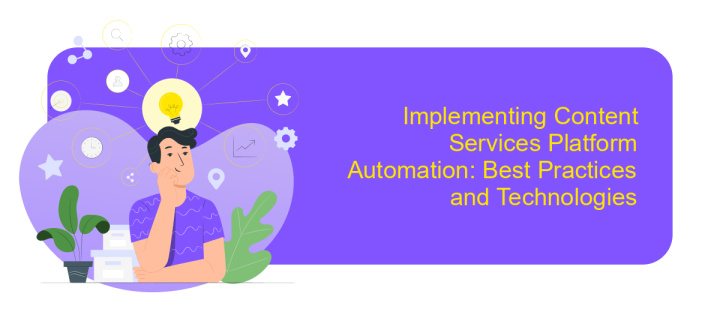Content Services Platform Automation
In today's fast-paced digital landscape, Content Services Platform (CSP) automation is revolutionizing how organizations manage and utilize their content. By streamlining workflows, enhancing collaboration, and improving data accessibility, CSP automation empowers businesses to operate more efficiently and effectively. This article explores the key benefits and strategies of implementing CSP automation, highlighting its potential to transform content management and drive innovation across various industries.
Introduction to Content Services Platform Automation
In today's fast-paced digital landscape, organizations are increasingly turning to Content Services Platform (CSP) automation to streamline their content management processes. CSP automation leverages advanced technologies to enhance the efficiency, accessibility, and security of digital content across various platforms. By automating routine tasks and workflows, businesses can significantly reduce manual effort, minimize errors, and improve overall productivity.
- Enhanced efficiency through automated content workflows
- Improved data security with automated compliance checks
- Seamless integration with existing enterprise systems
- Scalable solutions that grow with organizational needs
As organizations continue to generate vast amounts of data, the need for efficient content management solutions becomes increasingly critical. CSP automation not only addresses this need but also provides a strategic advantage by enabling organizations to focus on core business activities rather than time-consuming administrative tasks. By implementing CSP automation, companies can ensure that their content is managed effectively, securely, and in compliance with industry standards, leading to enhanced operational performance and competitive advantage.
Benefits of Automating Your Content Services Platform

Automating your Content Services Platform (CSP) can significantly enhance your organization's efficiency and productivity. By automating repetitive tasks, employees can focus on more strategic activities that require human insight and creativity. This not only streamlines operations but also reduces the likelihood of human error, ensuring that content is managed accurately and consistently. Automation tools can help in categorizing, storing, and retrieving content swiftly, which is crucial for maintaining agility in today's fast-paced digital environment.
Moreover, integrating automation with services like ApiX-Drive can simplify the process of connecting your CSP with other essential business applications. ApiX-Drive offers a user-friendly interface that allows seamless integration without the need for extensive technical knowledge. This enables organizations to create a cohesive ecosystem where data flows effortlessly between platforms, enhancing collaboration and decision-making. By leveraging such integrations, businesses can optimize their content management processes, reduce operational costs, and ultimately drive better business outcomes.
Key Automation Use Cases for Content Services Platforms

Automation in Content Services Platforms (CSPs) is transforming how organizations manage and utilize content. By streamlining processes and reducing manual intervention, automation enhances efficiency and accuracy. Key use cases demonstrate the potential of CSP automation to optimize operations and drive business growth.
- Document Processing: Automating document capture, classification, and indexing reduces errors and speeds up workflows, enabling faster access to critical information.
- Content Lifecycle Management: Automation ensures timely content archiving, retrieval, and disposal, maintaining compliance and minimizing storage costs.
- Workflow Automation: Streamlining approval processes and task assignments enhances collaboration and reduces bottlenecks, improving overall productivity.
- Data Extraction and Analysis: Automated data extraction from documents enables real-time insights and informed decision-making, driving strategic initiatives.
- Security and Compliance: Automated monitoring and reporting ensure adherence to regulatory requirements, protecting sensitive information and reducing risk.
These use cases illustrate the transformative impact of automation within CSPs, offering significant advantages in terms of time savings, cost reduction, and improved accuracy. By leveraging automation, organizations can unlock the full potential of their content, enabling smarter, more agile operations and fostering innovation across the enterprise.
Implementing Content Services Platform Automation: Best Practices and Technologies

Implementing content services platform automation requires a strategic approach to ensure seamless integration and maximum efficiency. Start by evaluating your organization's specific needs and existing infrastructure. This assessment will guide the selection of appropriate technologies and help in aligning automation goals with business objectives.
Next, focus on choosing a scalable platform that supports diverse content types and integrates well with other enterprise systems. This flexibility is crucial for adapting to evolving business requirements and ensuring long-term success.
- Conduct a thorough needs assessment to identify key automation areas.
- Select a platform that offers robust integration capabilities.
- Ensure scalability to accommodate future growth and changes.
- Prioritize security and compliance features to protect sensitive data.
- Engage in continuous training and support for staff to maximize adoption.
Finally, consider leveraging advanced technologies such as artificial intelligence and machine learning to enhance automation capabilities. These technologies can significantly improve content management processes by enabling intelligent data analysis, automated workflows, and predictive insights. By following these best practices, organizations can effectively implement content services platform automation to drive efficiency and innovation.
Future Trends in Content Services Platform Automation
As we look toward the future of Content Services Platform (CSP) automation, the integration of artificial intelligence and machine learning is expected to play a pivotal role. These technologies will enhance the ability of CSPs to manage and analyze large volumes of content more efficiently, providing businesses with actionable insights and improved decision-making capabilities. Additionally, the rise of AI-driven content classification and metadata tagging will streamline content retrieval processes, making it easier for organizations to access the information they need, when they need it.
Another significant trend is the growing emphasis on seamless integration capabilities. Platforms like ApiX-Drive are leading the charge by offering tools that simplify the process of connecting various applications and services. This trend towards enhanced interoperability ensures that CSPs can function as a central hub, facilitating smooth data exchange across different systems. Moreover, as remote work continues to be a norm, the demand for cloud-based solutions will increase, pushing CSPs to offer more robust, scalable, and secure cloud services to meet evolving business needs.
FAQ
What is a Content Services Platform (CSP) and how does it differ from traditional content management systems (CMS)?
How can automation benefit a Content Services Platform?
What types of integrations are possible with a Content Services Platform?
How can I implement automation in my Content Services Platform?
What are the security considerations when automating a Content Services Platform?
Do you want to achieve your goals in business, career and life faster and better? Do it with ApiX-Drive – a tool that will remove a significant part of the routine from workflows and free up additional time to achieve your goals. Test the capabilities of Apix-Drive for free – see for yourself the effectiveness of the tool.

